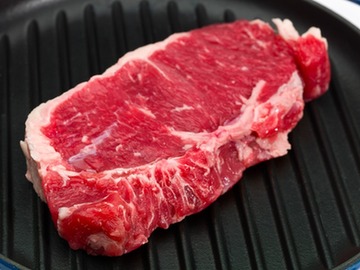The English language is full of food-related words which have taken on a distinctively figurative hue. A desirable position may be referred to as a plum assignment, and a well-liked person may be referred to as a peach. Yet another laudatory term from the world of fruit is a pip, which may designate either "a small fruit seed" or "one extraordinary of its kind." Various edible animals, such as chicken and turkey, have taken on extended meanings.

An ad in 1928 for the movie 'Greased Lightning' described it as "The Red Meat sort of Picture that You’ll Remember for Weeks,” and a 1926 newspaper ad for 'The Rainmaker' called it “A strong red-meat love drama.” So when did a term that used to describe movies begin to describe politics?
But what about food-related terms that do not come from a specific type of plant or animal? In a tumultuous election season, the one that comes immediately to mind is red meat.
Red meat is newer than one might suppose; our earliest known citation comes from 1792, found in George Colman’s play The Surrender of Calais: “Here’s meat, neighbours; fine raw red meat, to turn the tide of tears from your eyes, and make your mouths water." Red meat has since taken on the figurative sense of "something substantial that can satisfy a basic need or appetite."
Although it had long been thought that the newer sense of red meat entered our parlance in the 1960s, recent research has found that the use is older than that, dating back to the early 20th century. It originated (or at least achieved widespread use) in the motion picture industry:
An exchange manager recently complained to me if the lack of sensational subjects. His actual words were "They [the public] want red meat and they want it raw."
—The Nickelodeon, 7 Jan. 1911He told how ministers, representative citizens, had condemned the motion picture shows, and when he investigated it—the real red meat of the situation—the principal objection seemed to be because the price of admission was cheap.
—The Moving Picture News, 17 February 1912
By the 1920s, the term started to appear in advertising copy for films. An ad in 1928 for the movie Greased Lightning described it as "The Red Meat sort of Picture that You’ll Remember for Weeks,” and a 1926 newspaper ad for The Rainmaker called it “A strong red-meat love drama.”
In the 1940s red meat entered the political lexicon, with its meaning taking on some additional shades of "inflammatory."
He added the reminder that the leaders of the other Great Powers—Churchill, Stalin and Chiang Kai-Shek—are all older than Roosevelt, as are most of our own warrior chieftains, whom the Republican candidates nevertheless has promised to retain in command. It was a plate of red meat the temporary chairman served as a foretaste of the campaign to come.
—Daily Boston Globe, 20 July 1944Most of the audiences—that at Salt Lake City was an exception—were looking for red meat in Dewey’s carefully reasoned discussions of world affairs. Since he disdained mudslinging they seized upon his withering treatment of bureaucracy and governmental incompetence as a satisfactory substitute.
—The Sun [Baltimore, MD], 4 October 1948His success, making even Ted Cruz look mainstream, baffles many in the United States and abroad, who are used to seeing American politicians walk a careful line between red-meat populism and mainstream respectability.
—The New York Times, 14 April 2016The announcement last week that Harriet Tubman would replace Andrew Jackson on the front of the $20 bill was, of course, red meat to those who see political correctness lurking in every corner of the land.
—Florida Times Union, 24 April 2016
This political sense appears to be gaining steam, although it is as yet unclear whether or not the inflammatory political sense will be strong enough to demand a separate entry in the dictionary. Some lexicographers will probably say that "inflammatory political speech" should be split from "something substantial that can satisfy a basic need," while other will argue that all general figurative uses should be lumped together. For those who work on dictionaries, such quibbles are our red meat.




